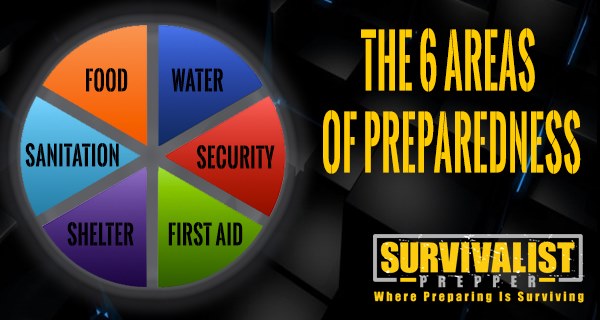
Provided by Emergency Manager, Michael Watkins
Whether you are preparing for a week or a year the 6 areas or preparedness should be your considered in everything you do while prepping. The 6 areas of preparedness are food, water, shelter, security, sanitation and first aid…not in any certain order.
These are the building blocks of any good preparedness plan. How you prepare in each of these areas will depend on your personal situation, but they need to be included in every preparedness plan.
STORING FOOD
How much food you store, and what you store is completely up to you. There are many suggestions about food storage in the prepper community, but your finances, family size, and storage space all need to be considered. The only wrong way to store food is to not have any when you need it.
WATER STORAGE & SAFETY
These days all you have to do is turn on your faucet and you have clean drinking water, but what if that wasn’t the case? Most people wouldn’t even know where to start if they had to clean their water, but you do, right? Honestly, cleaning water and making it drinkable isn’t as hard as it seems, it just takes a little bit of knowledge.
SURVIVAL SHELTER
When it comes to survival shelter, your home is the most important. Disasters come in different shapes and sizes, and bugging out might not be necessary. Our home is our base camp, so leaving it should be avoided if possible. With that being said, bugging out may be unavoidable, and we need to have the skills and knowledge to do so.
PERSONAL SECURITY
Your personal security starts with you and extends to your home and your surroundings. Everything we do on a daily basis either puts us at risk or makes us safer. Everything from what we do online, to protecting our home from intruders needs to be considered on a daily basis. If you carry a gun, be safe, be legal and be trained.
SANITATION
One commonly overlooked aspect of preparedness is sanitation. With the availability of over the counter medications, medical facility’s, and being lucky enough to live in a first world country, we don’t think about the dangers of bad sanitation. In a SHTF situation it’s not just about body odor and stinky feet. It’s about preventing illness, and not adding to an already bad situation.
FIRST AID & MEDICAL SKILLS
Whether you are in a natural disaster, or an all out SHTF scenario, first aid should be one of your top priorities. Most of these basic first aid skills are easy to learn, and when you do, you’ll have a better idea about what supplies you need. In a survival situation, you might be the only option. You could literally make the difference between someone dying or living. Our local Fire Depart provides First Aid and CPR training, get the whole family trained.